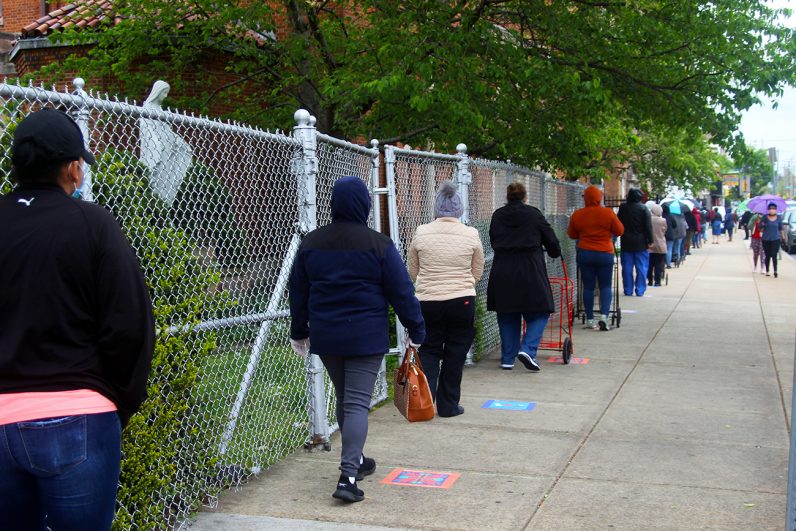
The line for an April 20 emergency food distribution at St. Joan of Arc Mission Church in Philadelphia stretched around the block. Archdiocesan Nutritional Development Services has redirected federally funded school meals to the area’s food-insecure children, while working with other local hunger relief agencies to provide dried goods and produce to families made food-insecure by the coronavirus pandemic. (Photo by Gina Christian)
An archdiocesan hunger relief agency is relying more than ever on a major annual food drive to meet unprecedented demand for assistance.
Nutritional Development Services (NDS) will host “Manna Sunday” from May 17 to June 1. The collection of non-perishable items, which normally takes place at parishes and schools, has been moved online due to COVID-19 restrictions.
Donors can purchase staples for NDS’s network of 30 food cupboards through the YouGiveGoods fundraising platform for shipment to NDS (a beneficiary of the Catholic Charities Appeal).
[hotblock]
Now in its third decade, Manna Sunday — named for the edible substance God provided the Israelites during their 40-year journey in the desert — has taken on a deeper meaning due to the COVID-19 pandemic, said NDS executive director Lizanne Hagedorn.
Typically, the initiative helps NDS to prepare for the “desert” of the summer months, when supplies at its pantries tend to thin with donors on vacation and schools closed.
“People aren’t usually thinking of those who are hungry at that time,” said Hagedorn.
But with the nation’s unemployment rate at 14.7%, food insecurity has become a major concern. The number of clients at NDS sites “continues to be higher than we’ve ever seen,” said Hagedorn, adding that many individuals and families are first-time visitors.
The need is dire, she said, and reactions to the food distributions have been intense.
As Hagedorn was helping to give out boxed meals last week, “people just instantaneously started crying and saying, ‘You don’t know how much this means and how much this will help,’” she said.
Hagedorn, whose agency also administers federally funded school meal programs, pointed to “some small silver linings here and there” amid the downturn, including the USDA’s April 22 announcement of a $2 billion increase in its Supplemental Nutrition Assistance Program (SNAP).
The week prior, Pennsylvania Gov. Tom Wolf advised that the state would begin issuing one-time SNAP emergency payments previously approved by the USDA.
Yet Hagedorn and her team — who have been coordinating nearly 101 emergency feeding sites in addition to the NDS food cupboards — know that for many area households, regaining food stability will take time.
“It’s a very hard thing for them,” she said. “In the long run, people want to be productive and feel that they’re providing for their families.”
***
For a list of food cupboards and emergency feeding sites operated by Nutritional Development Services (NDS), visit the agency’s COVID-19 resource page.
PREVIOUS: Juniata parish stays close to Mary, despite social distancing
NEXT: PCC urges Gov. Wolf to fix education funding disparity


Share this story